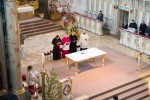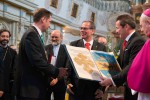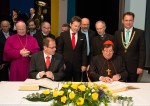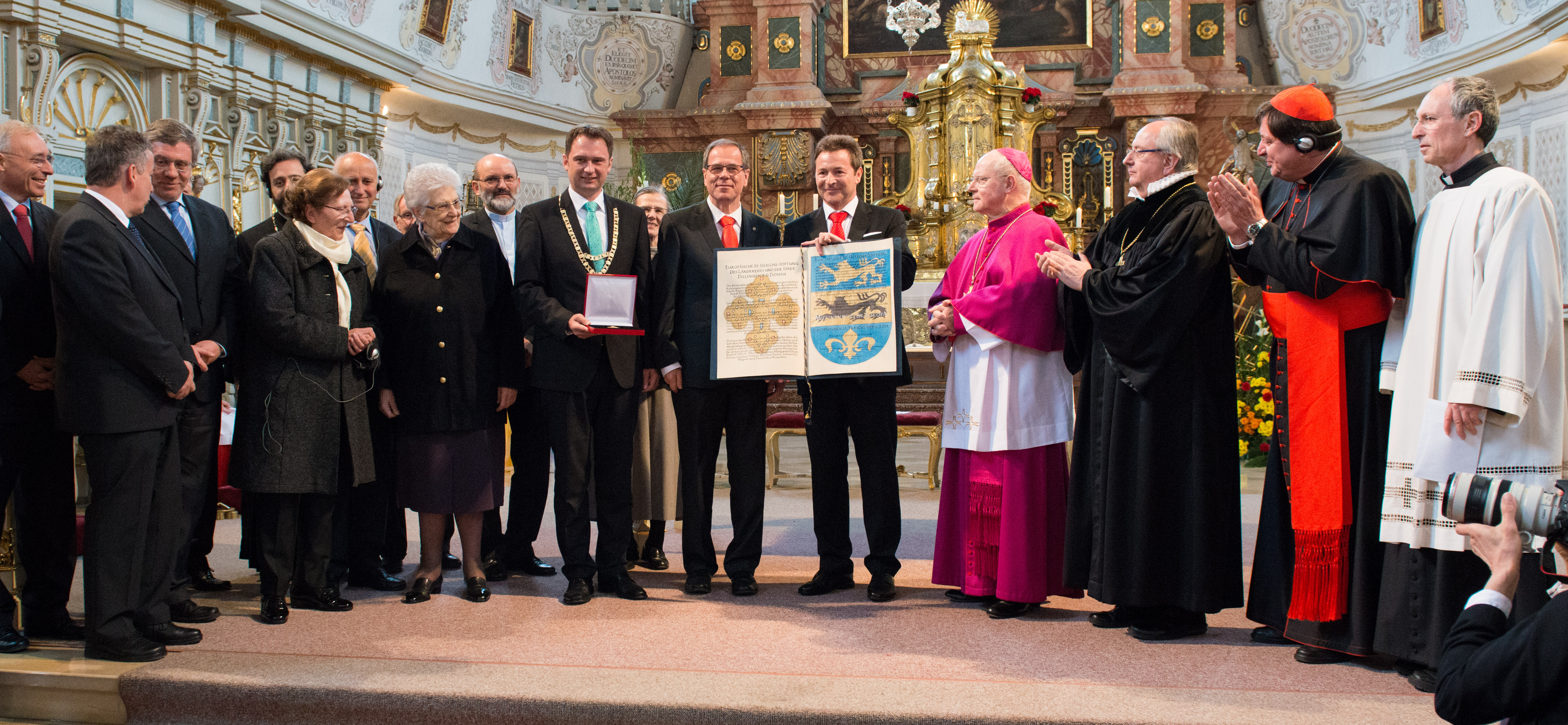
by Koni Brand | Sep 24, 2015 | News
Aware of the rich and age-old cultural history of our Bavarian-Swabian region, the province and the city of Dillingen on the Danube have established the “European Foundation of St. Ulrich.”
Through this Foundation, the province and the city of Dillingen on the Danube, the birthplace of St. Ulrich, aim to further European unity in the Christian spirit.
Since 1993, the 1,000th anniversary of the canonization of Bishop St. Ulrich, a figure of great importance for Germany and for Europe, the European Prize of St. Ulrich is awarded regularly to initiatives or institutions which have distinguished themselves by extraordinary merits in the area of European unity, in the political, ecclesiastical, scientific, cultural, economic and social fields.
“Building a Christian Europe” is the duty of all those who, on the basis of the cultural and artistic heritage and core values, desire to contribute to the future of our history. Great witnesses of the faith of our country, such as Bishop Ulrich, Albert the Great, Margarete Ebner, Peter Canisius, Johann Michael Sailer, Johann Ev.Wagner and Dominikus Ringeisen have given us outstanding examples.
The commitment of the international network of Together for Europe is driven by the vision of reconciled unity in diversity. The Movements and Christian communities which are part of it do not want to standardize the confessional or national identities, but together are committed to safeguarding and promoting the treasure of the Christian heritage in Europe. They build bridges in Europe taking steps towards reconciliation and weaving friendships beyond the most various borders. In this way, a current of hope inspired by the Gospel has been born, which involves men and women who are committed for the good of society. Recognizing these extraordinary merits, the European Foundation of St. Ulrich awarded the 2014 European Award of St. Ulrich to the network of Together for Europe, to which 300 Christian Movements and Communities belong.
Leo Schrell Frank Kunz Dr. Konrad Zdarsa
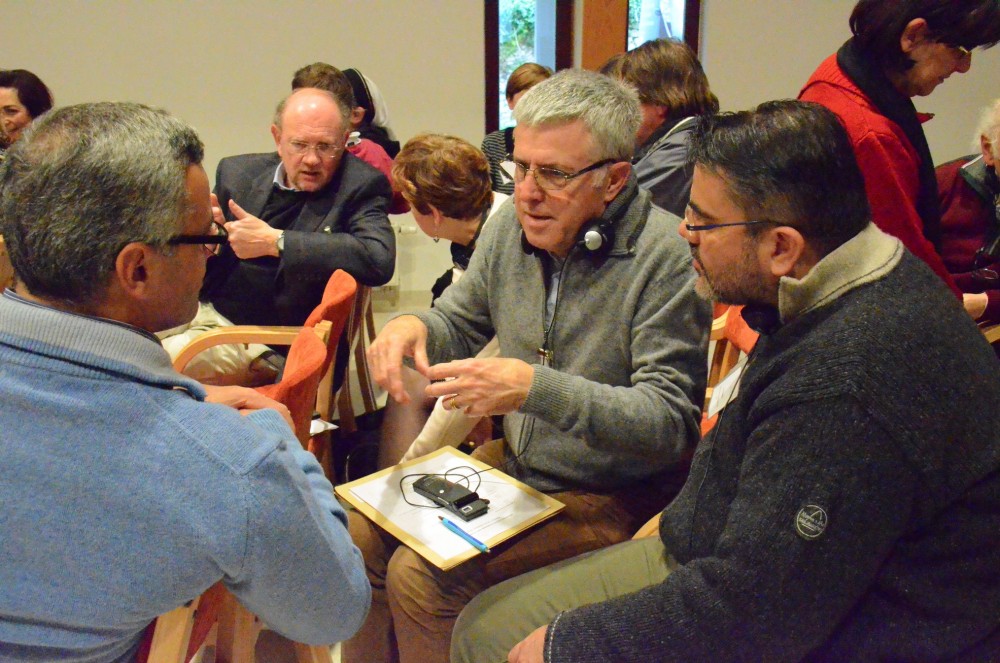
by Koni Brand | Sep 24, 2015 | 2013 - 2015 Friends
Excerpts from an update letter about their annual meeting and promotion of a European Event in 2016 in Munich, Germany.
In Planina, Slovenia, from November 13 to 15, 2014, 108 representatives of 41 Movements and Communities from 14 Nations have experienced an intense and constructive meeting where it was felt a renewed passion to collaborate on a project for a more united Europe.
Main theme of the meeting was the organization of an Event in Munich (Germany), June 30 to July 2, 2016, consisting of two parts: the Congress in Zirkus-Krone-Bau and the Outdoor Rally in a large square. Everybody felt the importance of feeling immediately engaged, so that the Outdoor Rally might be the fruit of life in the cities, marked by a significantly large participation.
The main focus of the Event should be a noteworthy act of reconciliation, expression of a strong yearning for unity. Together for Europe can be a driver in this direction, on account of the ongoing multiple experiences lived throughout the Continent, particularly between people of different Churches. For this reason, the 2016 Event could also be seen as a milestone in the journey towards 2017 (500th anniversary of Luther’s reformation), offering a prophetic sign of a reconciled and united Europe.
The Congress
Will take place from Thursday June 30 to July 1, 2016 in Zirkus-Krone-Bau in Munich, 2,500 seats. The leaders of about 300 Movements, which adhere to Together for Europe, are invited to attend.
The Congress wants to be a privileged occasion to renew the thrust of our Movements and Communities to work for a more harmonious, respectful and supportive Europe, developing projects which will be donated in the square Rally, on July 2.
The Congress will be held in plenary, along with about 15 – 20 forums to allow for dialogue among Movements and Communities about current issues, as well as round tables which will deal with some of the challenges posed by our society, with the help of “experts” from the cultural, political, sports, artistic worlds, etc…
The Outdoor Rally
Will take place on July 2, 2016, in a large square in the Munich centre. The idea is to gather in the morning according to language groups, in various nearby Churches and Institutions, and then march all towards the square around 11.30 am, where we will carry on with the main program (about 90 minutes). This will include short speeches, symbolic gestures, and testimonies. After a break for lunch, we will continue with a “creative program” of about two hours.
On the basis of the experiences of sharing and collaboration lived in the midst of sectarian and nationalistic tendencies present nowadays across Europe, we wish to offer an example of unity in diversity, by offering mainly testimonies of reconciliation, fruits of our daily experiences, lived in our own Communities together with other Movements present in various cities: experiences of “reconciled cultures” apt to build the future in a responsible way.
We would like to involve all European Nations (from North to South, from East to West), the Churches and the different generations. With this goal in mind, we invite everybody not to let any “inspiration” drop aside and put to good fruition ideas and personal acquaintances.
In order to develop and implement these lines, it is vital that until 2016 relations in all cities where Together for Europe is present become stronger. Concretely, we must support a path of reconciliation in the cities, accompanied by a journey of prayer. It is important to be resolved to go to Munich not to receive, but to give. Each bringing his own, it will be the whole that will make possible for the European conscience to recover and grow. In a dynamic reality, we want to give perspective to a European dimension not closed in itself, but open to others.
With the intent to prepare the whole Event together, admin@together4europe.org is at everybody’s disposal to furnish any information, material, etc. that might be needed, as well to receive any suggestions about the form and content of the Event.
Moreover, whoever wishes to also help cover the organization costs can make wire transfers to the account of Together for Europe using the following data:
IBAN code: IT37O0335901600100000113319; SWIFT: BCITITMX771
Country: Italy; Bank name: Banca Prossima; Account owner: PAMOM
Transfer title: “Contribution to the Event Munich 2016”.
A brochure in various languages (diversified according to the needs of the countries) is being worked on, as we aim to reach a significant participation, entrusted to each one’s initiative.
Timely updates and practical information for participation in the Outdoor Rally can be found on this site.
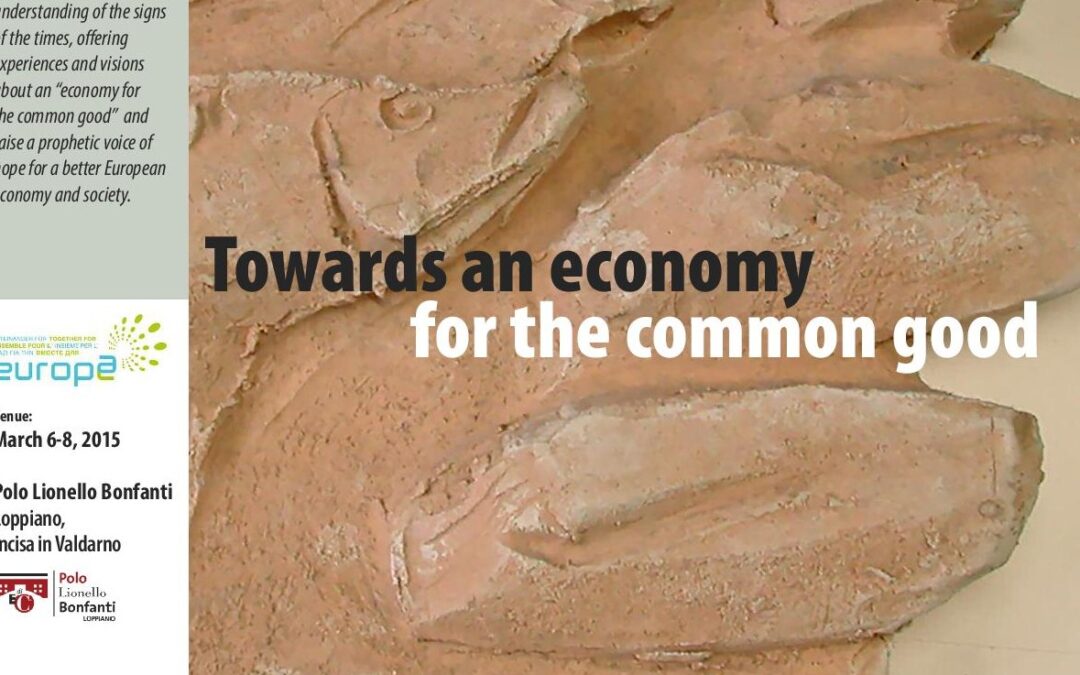
by Koni Brand | Jan 16, 2015 | News
From March 6 to 8, Christian Movements of “Together for Europe” held a congress In Loppiano – Incisa Val d’Arno (near Florence), aimed at giving a soul to the Europe of markets and economy. For the approximately 100 participants from various countries of Europe, it was an opportunity to share experiences and ideas, and to offer a prophetic voice of hope.
Among entrepreneurs, students and scholars, from 12 different communities, the main supporters of the initiative were members of the Focolare Movement, the YMCA in Munich, the Vineyard Community in Brussels, the Schoenstatt Movement in Switzerland, the Pope John XXIII Community, and the Nomadelfia Community in Tuscany
Europe continues to struggle with economic uncertainty that poses severe challenges for businesses, policy- makers and citizens. “In Europe, only the voice of the institutions has been heard so far “- said Prof. Luigino Bruni -. “our dream is that Franciscans, members of the Focolare, people who have chosen “the least” in society, take their place in the Economic ministries … We need the voice of gratuity. In recent decades, these voices were completely silenced. An economy with neither a soul nor charisms capable of including the poor has no future. What do Christian Movements have to say, today, about Economic policy? »
During the congress an effort was made to offer a contribution from the bottom, on the basis of solidarity, to give a voice to everyone, to the poor and the excluded. The objective was to present a perspective of Europe based on an economy of reciprocity and generosity, rather than interest and profit only. An economy derived from cooperatives, from social and civic commitment.
The program had theoretical parts, (such as the causes of the economic crisis in Europe, various experiences and talks on “charismatic economics”, including Father Kentenich’s “pedagogy of ideality” for entrepreneurs of the Schönstatt Movement), and also testimonies derived from practice (concrete experiences of the “Economy of Communion” and the economics of sharing, offered by various Movements). The evenings were devoted to prayer and praise to God, with a concert on the second evening by the international group Gen Verde.
One afternoon, about 100 young people (attending a much larger youth congress in Loppiano) joined in, offering their experiences. Despite their disappointment with the current employment situation for young people, they are striving to uphold their ideals with personal commitment, going ”against the current” of consumerism and by giving life to small scale sustainable models.
It became clear to everyone that in order to renew contemporary economy and avoid its “perverse effects” on people’s lives and the environment, it is necessary to transform Christian values into economic activities and structures.
Everybody, especially the entrepreneurs, felt a great desire to create networks and ways of sharing, and to join forces to give a stronger and more incisive witness to the world.
On leaving, all felt a renewed commitment to deepen what they had received in those days within their own Communities, and to share initiatives with other Movements. A participant concluded: “If we succeed in opening our minds and hearts, tearing down some walls, welcoming each other and creating spaces of encounter and exchange, then it will be possible to give a more effective witness of our Christian roots in the world.”
All videos of the interventions of the conference can be viewed on: https://www.pololionellobonfanti.it/insieme-per-il-bene-comune/
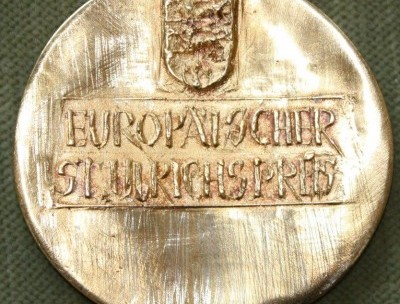
by Koni Brand | May 9, 2014 | News
“They build bridges in Europe with steps of reconciliation and weaving friendship across borders. The result is a current of hope inspired by the Gospel …”
This is the motivation of the European Prize of St. Ulrich, awarded to the Steering Committee of Together for Europe on 3rd May in Dillingen, an historic city in Bavaria (Germany). On hearing it, a long applause praised the culture of Communion.
The presentation was made to seven members of the Committee. Some of those who were there from the very beginning were also present1 . It took place before an audience of about 600 people.
The winners and representatives of 50 movements and communities were welcomed by civil and religious authorities in the square: Mayor Kunz, the Catholic Bishop of Augsburg, Zdarsa, and the regional Evangelical Bishop Grabow. A youth music group gave the welcome and the ceremony included songs and music of a very high standard.
For the first time the award ceremony took place in the Basilica during an ecumenical service.
It was the tenth occasion; previous winners include: Lec Walesa, Helmuth Kohl, Andrea Riccardi and other prominent names. In the presence of personalities from politics, economy, culture and the public life of the region, the laudation was given by the Brazilian Card. Joao Braz de Aviz, Prefect of the Congregation for Institutes of Consecrated Life, who came from Rome: “I note with gratitude the ecumenical witness of the journey of Together for Europe. It always opens new places where you can meet fraternally, generating mutual love between the Churches and thus opening up new approaches to what still divides us.”
The President of the Foundation, Landrat Leo Schrell said: “The impressive variety of movements involved makes it clear that the intuition of Together for Europe is supported by people from different churches and different backgrounds who have one purpose: to contribute to the unity of the Europe”.
According to Schrell this way “is capable of indicating a path for the future.”
See also the website of the administrative district: Photogallery and Downloads
Gerhard Pross expressed the gratitude of the Steering Committee and said: “European unity and spiritual unity are alive in the Christian movements: it could be a model for the European Union as a home for the one Church of Christ.” He pointed out that the ten thousand euro Prize would be used for young people and movements of Eastern Europe, for their journey in the programme of Together.
He also expressed gratitude to the pioneers of the Together for Europe, in particular Chiara Lubich and Helmut Nicklas .
After the group photo on the steps of the ‘Home of the city’, the event ended with signatures in the guestbook and cordial and well-prepared refreshments. The media were updated through interviews given to regional newspapers, radio and TV.
Various publications underlined the commitment to safeguarding and promoting the treasure of the Christian heritage in Europe, as St. Ulrich expressed.
The Steering Committee. On 2nd May, the Steering Committee met in the Ecumenical Centre of Ottmaring in view of upcoming events. The year 2016 is a focal point with the idea of organizing a conference, followed by a rally in a city in Germany between April and June 2016 (date to be determined). This event is of importance in view of 2017, the year that marks the five-hundredth anniversary of the beginning of the Reformation in Germany. Several cities have given proposals and ideas for initiatives, which were considered carefully. There was an atmosphere of collaboration and joy which led to a unanimous consensus to start the preparations.
Gabri Fallacara and Severin Schmid
1 Friedrich Aschoff, an evangelical from Renewal of the Spirit, Fr. Michael Marmann, a Catholic from Schönstatt and Sr.Anna-Maria aus der Wiesche, Prioress of the Evangelical Community of Christ in Selbitz.
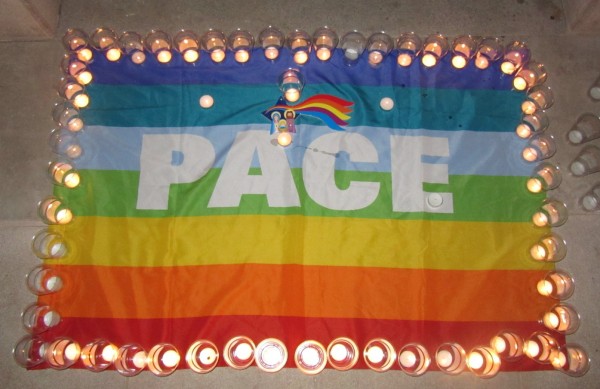
by Koni Brand | Dec 10, 2013 | Italy
From Germany (Würzburg)
“A very special day in our ‘Together’” – so the leaders of movements and communities of various Churches in Germany summarized the meeting of 7th December 2013 in Würzburg. 120 people involved in Together for Europe gathered to reflect on the past year and on the next steps to take.
Here is what Gerhard Pross, ‘Treffen von Verantwortlichen’, wrote: “The day began with a reflection on a thought from Chiara Lubich in which we are called to ‘Together’.
This was followed by a rich exchange of experiences of collaboration between movements and communities in various cities in Germany, such as the ‘Oasis of Peace and Prayer’, formed in Stuttgart.
The President of the German Bishops’ Conference, Archbishop Robert Zollitsch wished to visit the conference. In ‘Together’, he sees an initiative which unites the Churches, gives an important witness and is a sign of encouragement. He spoke particularly in view of 2017, the year which marks the 500th anniversary of the beginning of the Lutheran Reformation.
He hopes that this anniversary will become an opportunity of encounter and of new understanding. In the ensuing dialogue, several aspects emerged.
The ‘pact of mutual love’ came into relief, with which the network of Together for Europe was born. It is not enough to know one another; a real, fraternal collaboration is needed, which gives an example to the peoples of Europe.
‘For me it was an historic moment, there is someone who opens wide his arms’, said one of the Leaders. And another exhorted Archbishop Zollitsch to continue on this way with courage: ‘The people are on your side!”
During the conference, reference was made to the meeting of the ‘Friends of Together for Europe’ which took place last November in Paris. ‘Together’ welcomes not only movements of various Churches, but also belonging to almost all the peoples of Europe. This gives rise to a responsibility for a cultural, social and political contribution.
Gerhard continues: “With the German Committee we prepared the day of 7th December with a prayer of ‘listening’. When we were able to put aside all our considerations and we tried to listen to Him, then we felt encouraged. Someone said: ‘The Risen Lord is among us and says, ‘don’t be afraid!’’.
This meeting had a special grace and left in our hearts the certainty that ‘Together’ will go ahead and that we have been able to intuit something of the ‘score written in heaven’”.
From Ischia (Italy) 7th September 2013: Procession for Peace.
“On 7th September, 2013 – write Rita and Giulio Seller – on the occasion of the World Day of Prayer for Peace, the ‘Ischia for Europe’ Committee organized a major event for peace with a procession with songs and candles. As a sign of support, shops switched off lights and turned down sound. The march ended in the pine forest with speeches, poems and prayers about peace, contributed by Lutherans and Catholics, interspersed by musical pieces from some of the island’s artists. The Catholic bishop recorded a video message for the occasion.
Many left comments and reflections, expressing gratitude for the event”.
Gabriella Fallacara e Severin Schmid





